Tasty tour through South Africa's Winelands and tastiest coastal stretches in search of game-changing gourmands and the best restaurants in Cape Town


By Mary Holland
Mopping up a pool of beef jus with a Ujeqe noMsobho (Zulu steamed bun) felt so normal yet also entirely alien. The rich and warming umami flavours of the jus and the comforting, pillowy dough weren’t totally foreign flavours. Nor was the simple act of dipping the bread into a sauce. But eating this humble dish, prepared by Zimbabwean chef Vusi Ndlovu, in a fine dining setting at his restaurant Edge felt completely foreign.
Up until recently, there was zero chance you would have found a Zulu steamed bun on a high-end restaurant menu in Cape Town. Though the city has long been regarded as one of the best food destinations on the continent, with a host of covetable spots, including the only African restaurants to make the 50 Best List, the cuisine served has been chiefly foreign.
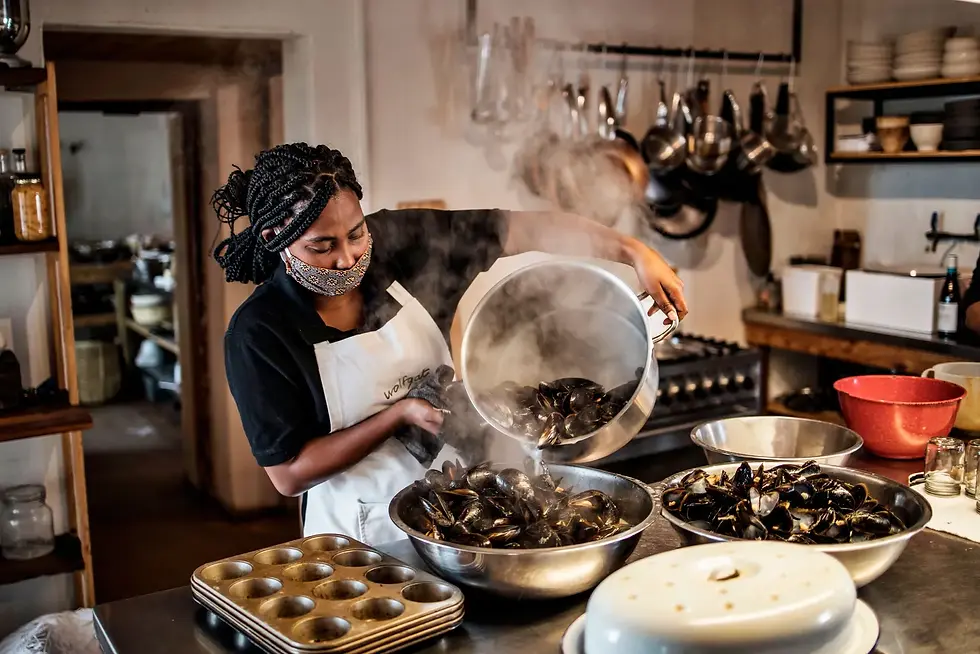
Emily, a cook with the South African Chef Kobus van der Merwe of the Wolfgat restaurant on the beach in Paternoster, works on a steamy load of freshly cooked mussels in the restaurants kitchen. Photo: Marco Longari
“Tourists come to South Africa, and they want to eat South African food,” says Vusi Ndlovu, chef and founder of Edge Restaurant and Mlilo. Ndlovu is one of the many Cape Town chefs who cook cuisine deeply rooted in the continent or connected to their culture. “How do we distil a taste of South Africa to someone who doesn’t know it?” asks Ndlovu. After working for a chef in Belgium, who cooked Flemish food from regional ingredients, Ndlovu had the idea of doing a similar thing back in South Africa. At the time, the movement was still in its infancy, but Ndlovu could see a growing demand for people wanting to enjoy fine African fare when they dined out. He opened Edge Restaurant (which first popped up at the Belmond Mount Nelson Hotel and will pop up again) to showcase dishes from around the continent. Ndlovu then went on to open Mlilo, a smaller spot at the Time Out Market, which is a little more low-key with dishes such as grilled corn, inspired by Mombasa and grilled Nigerian chicken wings with Jollof essence. He was also involved in opening Boma (though he’s since left), a vibey restaurant on Bree Street with tables that spill onto the sidewalk, geometric-patterned cushions and Malawian woven chairs. Here, they serve home-inspired meals cooked over a fire, such as peri peri chicken and lamb sosaties (skewers). “We wanted to create [something] more approachable [that] could be an everyday thing,” he says. One of the best-selling dishes on the menu was the simple jaffle – a type of toasted sandwich filled with tomato, aged cheddar, onion and chutney. “People related to it,” he says. And not only tourists seeking a taste of Africa, but locals too. “The one thing you can’t beat is nostalgia.”
Tapiwa Guzha tries an ice cream in his "Tapi Tapi" ice cream parlor. The molecular biologist has invented more than 600 unusual types of ice cream. Photo: Kristin Palitza/picture alliance/Getty Images | Seven Colours Eatery.
Photo: Marguerite Photography
Ndlovu will tell you that part of the reason this all feels so fresh is also because African cooking hasn’t been documented well, which is something he’s something he’s trying to change. “There’s a treasure chest of information,” says Ndlovu, who has travelled the continent, from Senegal to Kenya, looking for clues. “It’s all about talking to people and asking questions. It could be the lady at the market or [watching] Nigerian movies. We go to farms a lot and we speak to workers on the farm. What do you eat every day?” Recently, he learned they produce caviar in Madagascar, an ingredient he can’t wait to incorporate into his menu.
Egusi Dessert at Edge
Most African chefs who train at culinary schools also haven’t had the opportunity to cook the food they ate growing up. “We were taught European and French food,” says Anwar Abdullatief, chef and owner of The Happy Uncles. If you didn’t cook that type of food, Anwar says, you wouldn’t get your degree. “It’s so drilled into you [that there’s] a fear of stepping out,” he says. After working in the Winelands for many years, Abdullatief moved back to Cape Town to be closer to his family. “I missed the food I grew up eating – Cape Malay and Afrikaans.” He hadn’t intended on opening a restaurant, but after spending time eating his mom’s food and rediscovering dishes he thought he didn’t like as a child (meatballs cooked in cabbage), as well as paging through books and family recipes, he felt the urge to get back into the kitchen with a new perspective. “I discovered there are hundreds of recipes that are not being cooked,” he says. “The Cape Malay culture is dying in food; someone needs to take responsibility for it,” says Abdullatief. He then opened the first halal fine dining restaurant in the country in Salt River, a predominantly Muslim and Cape Malay area. Though the menu changes frequently, diners delve into wholly South African dishes such as amagwinya (doughnuts) filled with Karoo lamb and a custard and malva pudding with a milk tart cremeux; all served on delicate plates. At first, he was worried the no alcohol policy would ward off diners, but he’s experienced the opposite. On any given night, the restaurant is packed with locals and foreigners, some of whom take Ubers straight from the airport because they can’t wait to try his Cape Malay-inspired food. “When I look around the restaurant, there’s [sometimes] a family from California [sitting next to] a local Muslim family.”
Egusi Dessert at Edge | JAN Franschhoek - JAN, La Motte Wine Estate
The importance of bringing these dishes out of the homes and into the restaurant setting also goes far beyond impressing foreign diners. “It’s important that [our] stories are being told,” says Nolukhanyo Dube-Cele, who sees food as a way to share each other’s cultures. At her restaurant, Seven Colours Eatery, she cooks unfussy homey staples, such as samp (maize corn that is cooked in a cream) and oxtail bolletjies. Her aim is for the food to be approachable and incorporate elements from all different cultures–from Xhosa to Afrikaans. “We come from a very dark history. I’m on a journey of healing my country, and one of the ways of doing this [by being] inclusive,” she says. “It’s about unity.” Despite the country’s fractured history though, South Africans have a tendency to bring people together and share their culture, which bodes well for a hospitality establishment. “People now know that African culture is about friendliness and ubuntu,” says Ndlovu.
JAN Franschhoek - JAN, La Motte Wine Estate | JAN Franschhoek - JAN, La Motte Wine Estate
Even chefs who have been cooking up local cuisine for years are starting to incorporate food from all different cultures. Kobus van Der Merwe, who owns Wolfgat in Paternoster (listed as the best restaurant in the world) is constantly experimenting with new ingredients. At his tiny white-washed seaside restaurant outside Cape Town, Van der Merwe forages for things like dune spinach and uses sustainable, locally caught seafood. He’s also building his dishes around elements that aren’t always highly sought-after in restaurant kitchens, such as amasi (fermented milk). “We try to use a lot of alternative ingredients that are overlooked, like sorghum or millet. That’s a golden thread we wanted to bring through.” Nldovu, too, has been delving into Afrikaans cuisine. “We create food that people can connect with [and] tell a story of South Africa and the Western Cape.” Chef and restaurateur Jan Hendrik van der Merwe, who has been elevating Afrikaans cuisine for years at his Michelin-starred restaurant Jan in Nice and Klein Jan in the Kalahari, has recently begun to tap into other cultures. At Jan Franschhoek at La Motte wine farm in the Cape Winelands, diners will find a mixture of Afrikaans-meets-French plates: guinea fowl pie and pap and slap, a play on pap and vleis (maize porridge and grilled meat). But also some Sotho, Xhosa and Zulu. “It’s not only Afrikaans anymore,” he says. For Van der Merwe, the fact that South Africa has so many cultures from which to draw inspiration is its secret ingredient. “We have the privilege to do this, and other countries don’t,” he says. “We are so new in the cuisine world. We all know the story of the French and the Spanish. Now it’s our time.”
The best restaurants in Cape Town

The Happy Uncles
The Happy Uncles
South Africa’s first halal fine-dining establishment where chef Anwar Abdullatief prepares Cape Malay cuisine in a raw brick warehouse-like space in Salt River. The menu is ever-changing, but expect Malay curries, foraged tartlets with local greens and an amagwinya (doughnut) filled with Karoo lamb and smoked tarragon buttercream. Though there’s no alcohol, Abdullatief has curated a drinks pairing of local teas and zingy mocktails.
Address: The Happy Uncles, 100 Voortrekker Road, Salt River, Cape Town, 7925
Website: thehappyuncles.com
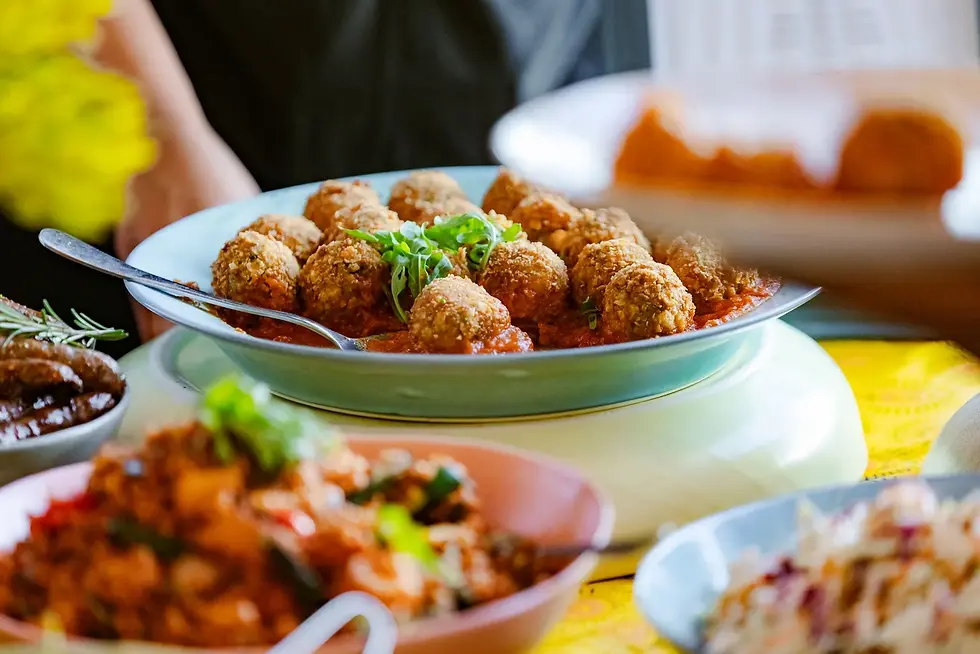
Family Dinner at Seven Colours Eatery
Seven Colours Eatery
This is the perfect lunchtime spot, located at the V&A Waterfront in a bright dining room with colourful baskets on the walls. Whatever you do, arrive hungry because chef Nolukhanyo Dube-Cele loves to create hearty plates brimming with food. Try the vetkoek/igwinya (fried dough) stuffed chakalaka and mince or Tshisanyama plate, which includes boerewors (sausage) with potato salad and coleslaw.
Address: Seven Colours Eatery, Battery Park@Waterfront, 3 Dock Road, Victoria & Alfred Waterfront, Cape Town, 8001
Website: sevencolourseatery.co.za

South African Chef Kobus van der Merwe, of the Wolfgat restaurant on the beach in Paternoster.
Photo: Marco Longari/Getty Images
Wolfgat
On a windswept coastline northwest of Cape Town, Wolfgat celebrates foraged ingredients (dune spinach), local meats, and seafood. The tasting menu has an array of bright dishes such as cured yellowtail with seared watermelon and cape bream with summer squash and fish roe. It’s best enjoyed on the sea-facing terrace of the white-washed fisherman’s cottage with a glass of crisp white wine from the neighbouring Swartland wine region. Be sure to pop by van der Merwe’s shop, Dispens, afterwards, where you can pick up local wines, pastries and preserves.
Address: Wolfgat, 10 Sampson Street, Kliprug, Paternoster, 7381
Website: wolfgat.co.za

JAN Franschhoek - JAN, La Motte Wine Estate
Jan Franschhoek
Jan Franschhoek is a restaurant from chef Jan Hendrik van der Westhuizen set in a tiny cottage amongst the vines in the Cape Winelands. Having earned a following thanks to his Michelin-starred restaurants Jan in Nice and Klein Jan in the Kalahari, van der Westhuizen has become known for elevating Afrikaans cuisine. At Jan Franschhoek, a mixture of homestyle and fine dining food, from guinea fowl pies to pap (maize meal) and meat with chimichurri, is served at a long sharing-style table for 16 diners.
Address: Jan Franschhoek, R45, Franschhoek, 7691, South Africa
Website: la-motte.com

Vadivelu
While Indian cuisine is predominantly found in Durban, Vadivelu is about as authentic as can be found in Cape Town. Chef Jai, who studied in Tamil Nadu, creates his signature spicy Durban curries with fiery curry powders and dry-roasted chillis. He also makes staples such as dosas and butter chicken. This is all enjoyed in a colourful dining room with green booths and jungle wallpaper.
Most Popular
Address: Vadivelu, 151 Kloof Street, Gardens, Cape Town, 8001
Website: vadivelu.co.za
Vadivelu

Mlilo
Fire-cooked fare from around Africa, such as corn from Mombasa, jollof rice from Nigeria and boerewors from South Africa, is served in this slick, inky nook at the Time Out Market at the V&A Waterfront. Founded by chef Vusi Ndlovu, who has pounded the pavements of cities across Africa, a meal here is undoubtedly the best way to get a taste of some of Africa’s best flavours.
Address: Time Out Market Cape Town, The Old Power Station, Dock Road, Victoria & Alfred Waterfront, Cape Town, 7806
Website: timeoutmarket.com
Mlilo by Edge

Boma on Bree. Photo: Laura McCullagh @laura.mcc_za
Boma
On any given evening, you’ll find people spilling out onto the sidewalk, cocktails and glasses of wine in hand. But they don’t just go to Boma for the buzzy vibe or the playful interior with Malawi-made woven chairs and vibrant cushions; they also go for the food. Almost everything here is cooked over an open fire, from the signature cheese jaffles to the lamb sosaties (skewers) and braai plate, which has grilled boerewors, steak and chicken.
Address: Boma, 107 Bree Street, Cape Town City Centre, Cape Town, 8000
Website: thefirmct.co.za

Tapiwa Guzha stands in his "Tapi Tapi" ice cream parlor. Photo: Kristin Palitza/picture alliance via Getty Images
Tapi Tapi
At this ice cream shop, Zimbabwean owner Tapiwa Guzha uses his background in molecular biology to experiment with exciting new flavours from lesser-known African ingredients. Hidden down a small alley in Observatory, visitors can stop by and try a scoop of hand-churned ice cream that comes in an array of ever-changing flavours, from kelewele (plantain) to urwarwa (banana beer).
Address: Tapi Tapi, 76 Lower Main Road, Observatory, Cape Town, 7925
Website: tapitapi.co.za
Read the original article on Condé Nast Traveller.
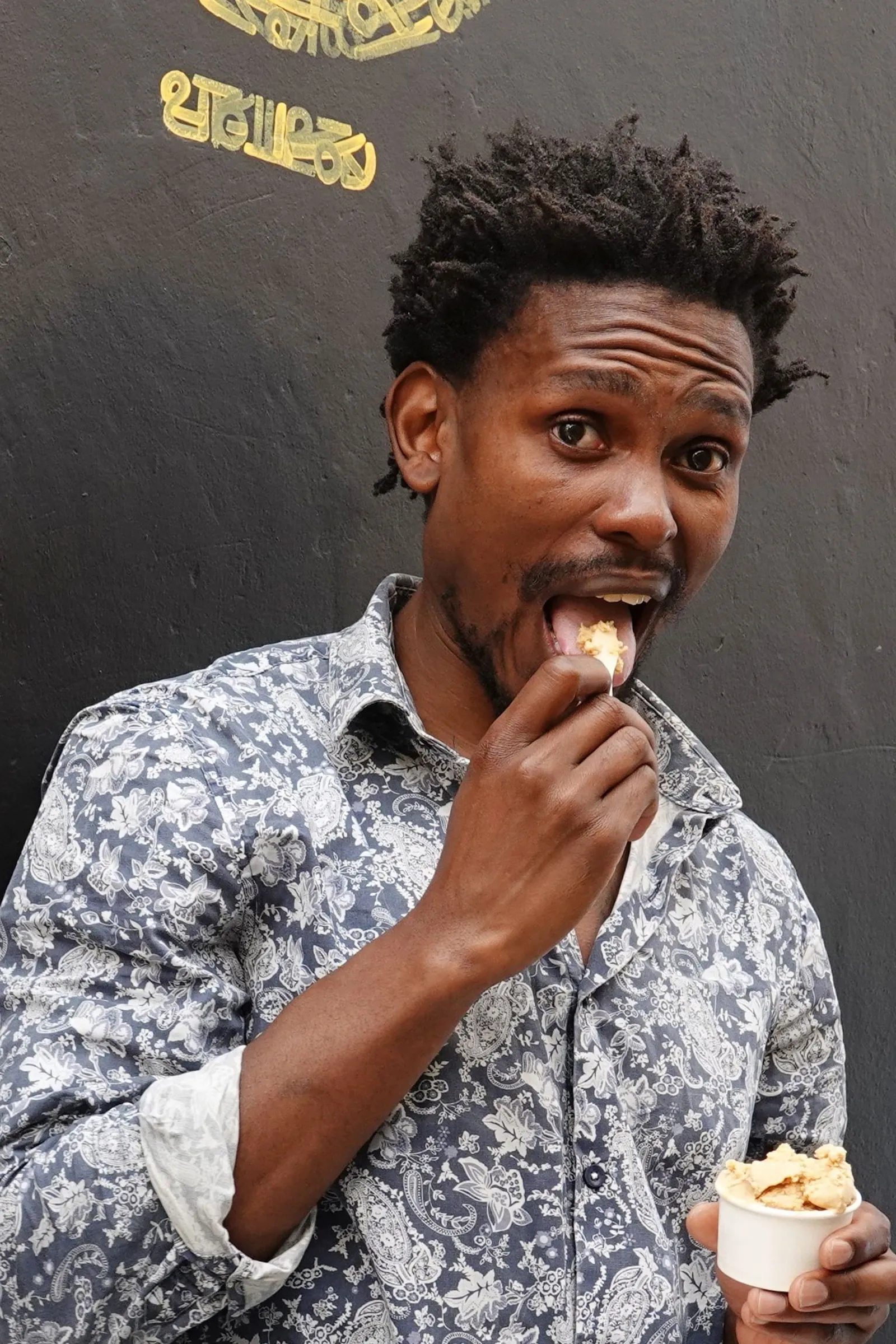




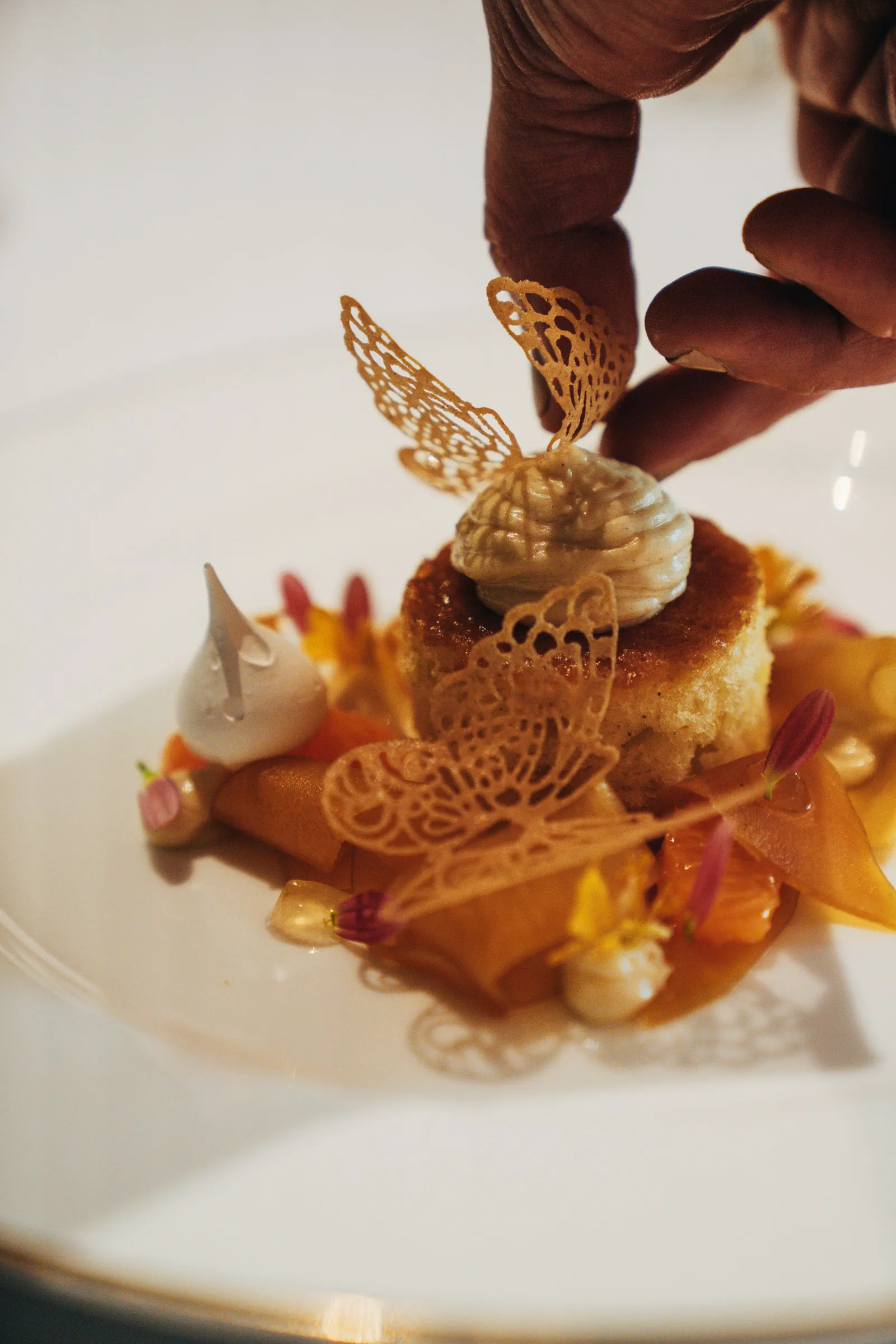
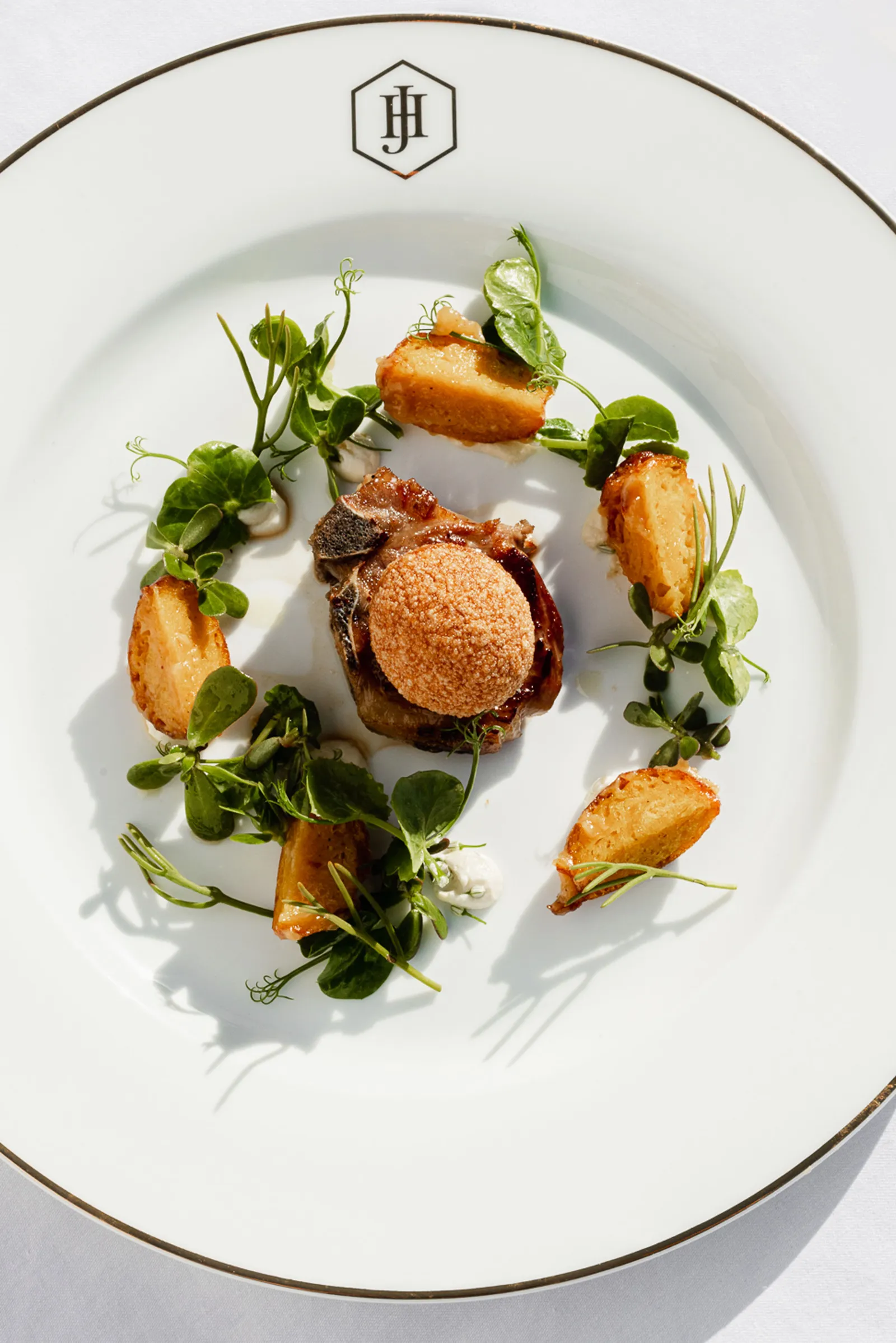

Comments